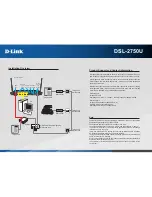
VES-1616F/1624F-44 User’s Guide
112
Chapter 14 Link Aggregation
The following table describes the labels in this screen.
Table 36
Link Aggregation Control Protocol: Configuration
LABEL
DESCRIPTION
Link Aggregation Control Protocol
Active
Select this checkbox to enable Link Aggregation Control Protocol (LACP).
System
Priority
LACP system priority is a number between 1 and 65,355. The switch with the lowest
system priority (and lowest port number if system priority is the same) becomes the
LACP “server”. The LACP “server” controls the operation of LACP setup. Enter a
number to set the priority of an active port using Link Aggregate Control Protocol
(LACP). The smaller the number, the higher the priority level.
Group ID
The field identifies the link aggregation group, that is, one logical link containing
multiple ports
Active
Select this option to activate a trunk group.
Dynamic
(LACP)
Select this check box to enable LACP for a trunk.
Port
This field displays the port number.
Group
Select the trunk group to which a port belongs.
LACP Timeout Timeout is the time interval between the individual port exchanges of LACP packets in
order to check that the peer port in the trunk group is still up. If a port does not respond
after three tries, then it is deemed to be “down” and is removed from the trunk. Set a
short timeout (one second) for busy trunked links to ensure that disabled ports are
removed from the trunk group as soon as possible. Select either 1 second or 30
seconds.
Apply
Click
Apply
to save your changes back to the switch.
Cancel
Click
Cancel
to begin configuring this screen afresh.
Summary of Contents for VES-1616F-44
Page 1: ...VES 1616F 1624F 44 VDSL Switch User s Guide Version 3 50 2 2007 Edition 2...
Page 9: ...VES 1616F 1624F 44 User s Guide 8 Customer Support...
Page 23: ...VES 1616F 1624F 44 User s Guide 22 List of Figures...
Page 27: ...VES 1616F 1624F 44 User s Guide 26 List of Tables...
Page 53: ...VES 1616F 1624F 44 User s Guide 52 Chapter 4 The Web Configurator...
Page 63: ...VES 1616F 1624F 44 User s Guide 62 Chapter 5 System Status and Port Statistics...
Page 93: ...VES 1616F 1624F 44 User s Guide 92 Chapter 7 VLAN...
Page 103: ...VES 1616F 1624F 44 User s Guide 102 Chapter 10 Spanning Tree Protocol...
Page 117: ...VES 1616F 1624F 44 User s Guide 116 Chapter 15 Port Authentication...
Page 139: ...VES 1616F 1624F 44 User s Guide 138 Chapter 18 Queuing Method...
Page 145: ...VES 1616F 1624F 44 User s Guide 144 Chapter 19 Classifier...
Page 150: ...VES 1616F 1624F 44 User s Guide Chapter 20 Policy 149 Figure 73 Policy Example...
Page 151: ...VES 1616F 1624F 44 User s Guide 150 Chapter 20 Policy...
Page 157: ...VES 1616F 1624F 44 User s Guide 156 Chapter 21 VLAN Stacking...
Page 165: ...VES 1616F 1624F 44 User s Guide 164 Chapter 22 Multicast...
Page 173: ...VES 1616F 1624F 44 User s Guide 172 Chapter 23 Multicast VLAN Registration...
Page 177: ...VES 1616F 1624F 44 User s Guide 176 Chapter 24 DHCP...
Page 181: ...VES 1616F 1624F 44 User s Guide 180 Chapter 25 Differentiated Services...
Page 182: ...VES 1616F 1624F 44 User s Guide Chapter 25 Differentiated Services 181...
Page 183: ...VES 1616F 1624F 44 User s Guide 182 Chapter 25 Differentiated Services...
Page 193: ...VES 1616F 1624F 44 User s Guide 192 Chapter 27 Maintenance...
Page 195: ...VES 1616F 1624F 44 User s Guide 194 Chapter 28 Diagnostic...
Page 199: ...VES 1616F 1624F 44 User s Guide 198 Chapter 29 Syslog...
Page 259: ...VES 1616F 1624F 44 User s Guide 258 Chapter 33 Command Examples...
Page 267: ...VES 1616F 1624F 44 User s Guide 266 Chapter 34 IEEE 802 1Q Tagged VLAN Commands...
Page 277: ...VES 1616F 1624F 44 User s Guide 276 Chapter 35 Troubleshooting...
Page 281: ...VES 1616F 1624F 44 User s Guide 280 Product Specifications...
















































